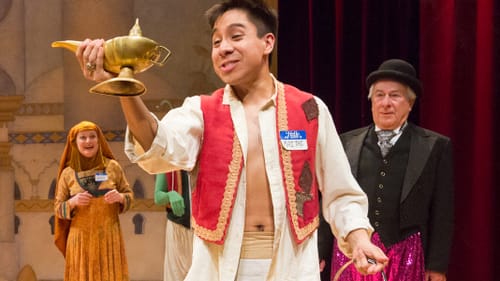Stay in the Loop
BSR publishes on a weekly schedule, with an email newsletter every Wednesday and Thursday morning. There’s no paywall, and subscribing is always free.
When did it cross your line?
Another response to People's Light's 'Aladdin: A Musical Panto'

I am many things. But the predominant identity threads that brought me to write this piece are that I am the resident dramaturg at People’s Light & Theatre Company, and I was the dramaturg for Aladdin: A Musical Panto. That show recently met with accusations of yellowface and cultural appropriation by Melody Wong, among others. But more significantly, I am Asian American.
I am also writing with the full support of People’s Light’s artistic leadership and Aladdin’s writing and directing team. All have engaged in deep conversations about artistic choices and critical responses to the show in terms of race and representation.
Specifically, I am Korean American and was born in Pusan, South Korea. Even more specifically, I was adopted with my twin sister when we were three months old by a couple from South Philly. We were baptized with an Irish last name in a neighborhood where European ancestral pride ran deep.
Heightened awareness and blind spots
As Asians who eventually became Asian Americans in a white neighborhood, we were oddities (and, yes, taunted as such). But as Asian twins, we were more often met with curiosity and interest. My name was often replaced with “one of the McGlinchey twins,” which occasionally frustrated me. But most of the time, my twinness was central to my identity.
Of course, my Asianness continued to loom large, especially when I entered the theater, a field of hypervisibility. The lack of people who looked like me on and surrounding the U.S. stage triggered my search for them, and led me to graduate work in Asian-American theater history, critical race studies, and artistic negotiations of race in performance.
I go into all this personal history to provide context for my heightened awareness and critical lens. I also offer context for my own blind spots, because when it comes to talking about the multivalent tangle that is race in the United States, we all have them.
{photo_2}
Within this conversation context matters, particularly when images, events, and encounters cross our lines. For example, part of my Asian-American experience includes being “ching-chonged” by packs of teenage boys and asked by one of my graduate professors if English was my first language. As a result, I’m hyperaware of how language is prejudged by Asianness and the othering that comes with it.
But I did not grow up with or around any Asian names, so the names of Aladdin’s characters Mai Tai and Fu did not elicit the visceral response from me that they did for Wong.
What's in a name?
While I was spared the ridicule that can come with an Asian name, I certainly felt its absence, and subsequently chose a Korean phrase for my sixth-grade confirmation name. Decades later, I gave my daughter a Korean name. Because my search for Asian-ness began from absence, my activism is articulated by and driven toward notions of presence and visibility.
Princess Mai Tai, performed and powerfully sung by Samantha Funk — who reads as Asian onstage — offers an amazing moment of multidimensional visibility to me as an Asian theater practitioner and audience member. Despite the character’s arguably problematic name, my daughter, now four years old, has donned a tiara for weeks and has not stopped singing Mai Tai’s songs.
Other audience members may not feel this sense of elation, which is entirely appropriate. After all, there is never only one way any one theatrical moment can be received. This is especially true of the panto.

Dramaturgically, People’s Light’s panto holds multiple simultaneous elements and modes of performance. For example, in one scene, Aladdin (played by Camilo Estrada) asks an audience member to don a cape, wide-brimmed cavalier hat, and Cyrano nose and to repeat lines in efforts to woo the Princess. The audience member is also asked to sing an impassioned version of “Despacito.”
At that moment, multiple narrative threads intersect: a Latino body in performance as an enamored video-game designer; an iconic wooing scene from the 19th-century French epic Cyrano de Bergerac; a pop song that topped the 2017 charts in 47 countries; the Spanish language; an unsuspecting audience member on stage; and the backdrop of a text first introduced in France at the beginning of European Chinoiserie. All of it is set within the story of 1,001 Nights.
Nothing exists in isolation
In these constantly intersecting narratives, nothing, including representations of race and other identity categories, exists in isolation. After 14 years, People’s Light’s panto artists and audiences have come to revel in this dynamic intersectionality.
Taken out of this context, I agree: racialized character names and images can be a real problem. Even within this intersectional worldview of the People’s Light panto, where multiple truths are simultaneously possible, representations of race, gender, class, or age can still hit a nerve and cross your line.
So, here I offer my own truths and foibles that can be set alongside the truths from Wong and others offering critiques. I did not write this to be “right” or to prove anyone “wrong.” Any emotional response to theater is legitimate.
I will to continue to ask, “When did it cross your line?” Like the panto, people’s identities hold many simultaneous elements, including complicated global and personal histories; we are in constant formation. Let’s keep having meaningful conversations about the multitudes that make us and how we can move us all forward.
To read Melody Wong's response to People's Light's Aladdin, click here.
To read Mark Cofta's review, click here.
What, When, Where
Aladdin: A Musical Panto. By Peter Pryor and Samantha Reading, music and lyrics by Michael Ogborn, Peter Pryor directed. Through January 7, 2017, at the People's Light & Theatre Company's Leonard Haas Stage, 39 Conestoga Road, Malvern, Pennsylvania. (610) 644-3500 or peopleslight.org.
Sign up for our newsletter
All of the week's new articles, all in one place. Sign up for the free weekly BSR newsletters, and don't miss a conversation.
 Gina Pisasale
Gina Pisasale